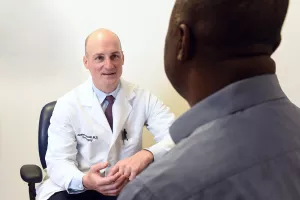You may think that having a single seizure or even multiple seizures means you have epilepsy, but that's not always the case. To be diagnosed with epilepsy you must have two seizures at least 24 hours apart that can't be explained by another condition.
Seizures are electrical storms in your brain
Epilepsy is a neurological condition commonly known as a "seizure disorder" that will affect one in 26 people in their lifetime.
Seizures happen when there is a surge of electrical activity in your brain that some people refer to as "electrical storms," according to the Epilepsy Foundation. These electric shocks interrupt normal brain activity and can last for a few seconds to minutes.
If you've experienced one or multiple seizures, you know it can be scary. We'll work with you to control your symptoms and lessen worry so you can live as close to a normal, seizure-free life.

Conditions
Epilepsy is a brain disorder that causes people to have recurring seizures. Seizures happen when clusters of nerve cells, or neurons, in the brain send out the wrong signals.
People experience a range of symptoms like feeling strange, tingling sensations, nausea, anxiety, muscle spasms or they may lose consciousness.
There are two main types of seizures:
- Generalized seizures affect both sides of the brain
- Focal seizures or partial seizures affect one side of the brain
Testing
We work closely with specialists from pediatric epilepsy, neuropsychology, neuroradiology and neurosurgery to examine the cause and treat your seizures from every possible angle.
Whether you've had one or multiple seizures, one thing is certain—we want to help you avoid having more seizures.
You may be referred to our program for testing when:
- You have a seizure for the first time
- Multiple anti-seizure medications have proven ineffective
- Your doctor needs help deciding whether epilepsy surgery or other treatments would be effective
What to expect during your first visit
When you arrive to begin your care journey, your physician will gather important details about your seizures and any tests you've had, including:
- Computerized tomography (CT scan)
- Electroencephalogram (EEG) if you haven't been diagnosed with epilepsy or another seizure disorder
- Physical exam
- Magnetic resonance imaging (MRI)
- Neurological exam
- Any videos of a seizure episode
EEG tests measure electrical activity in the brain and are the most common test for diagnosing epilepsy. Our doctors are highly skilled at performing EEGs which are safe and painless.
We also offer a monitoring service where you stay at our hospital for multiple nights so we can capture information during a seizure episode. There are also options for EEG monitoring from the comfort of your home.
Treatments
If you've only had one seizure, and your tests are normal, your doctor may choose to monitor your condition over time. However, in some cases, you may be required to take anti-seizure medication to prevent future seizures. If medication is ineffective, surgery may be considered an alternative option.
Medication
If you do need treatment, there are anti-seizure medications that can help control your symptoms. We aim to find medications that prevent your seizures and produce little-to-no side effects.
Non-medication
We'll look to other treatment options if you don't respond to medications. A stay at our long-term monitoring service can help us determine where your seizures originate in the brain. Depending on what we see, epilepsy surgery may be an option to eliminate future seizures. Our multidisciplinary team, including a neurosurgeon, will help you decide whether surgery is right.
Other treatment options include:
- Vagal nerve stimulation: A treatment that involves implanting a pacemaker that sends small electrical pulses via wires to the brain
- Stereotactic laser interstitial thermal therapy (LITT): uses intense light energy to heat and eliminate areas of the brain that set off seizures.
- Changes in diet: We may suggest you work with a registered dietitian to try a ketogenic diet which is a special high-fat, low-carbohydrate diet that helps control seizures in some people
- Clinical trials: We offer access to promising new therapies (participation is voluntary)
Follow-up
Taking care of your health, managing and preventing seizures is an ongoing process. We will likely recommend you continue visiting our program and your primary care doctor to control your symptoms and seizures.

From regular office visits to inpatient stays, find the healthcare you need and deserve close to home.

Meet the doctors and care team devoted to supporting you every step of the way along your path to better health.